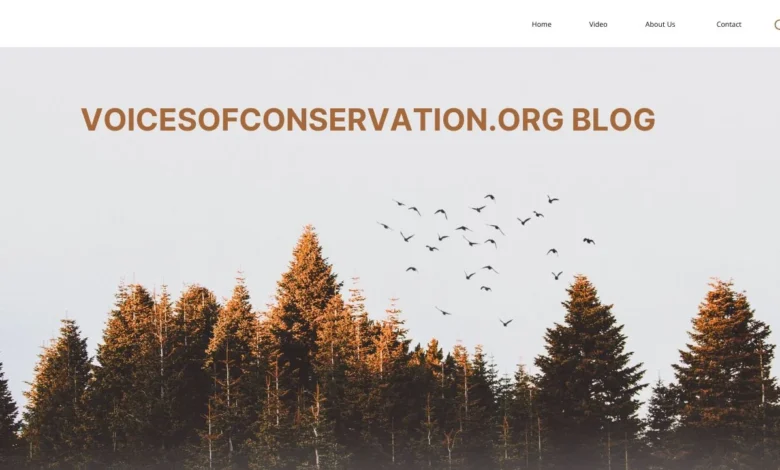Why Is Conservation Important: From voicesofconservation.org blog

Conservation is a practice that focuses on protecting natural resources, wildlife, and habitats to ensure their survival for future generations. The idea is to manage ecosystems so they remain healthy and sustainable. Many species are endangered due to human activities such as deforestation, pollution, and overfishing.
By focusing on conservation, we help preserve biodiversity and maintain a balanced environment. According to from voicesofconservation.org blog, protecting nature is not only about saving species but also about sustaining human life. Without healthy ecosystems, we would face challenges such as food shortages and climate disasters.
How Does Conservation Impact Wildlife?
Wildlife plays a crucial role in keeping ecosystems balanced. Animals contribute to various processes like pollination, seed dispersal, and nutrient cycling. However, many animals face threats from poaching, habitat destruction, and climate change.
Conservation efforts focus on creating protected areas where animals can live and breed safely. From voicesofconservation.org blog, there is evidence that protected wildlife reserves help species recover and thrive. For example, the population of tigers in India has grown due to efforts to preserve their habitats and stop illegal hunting. Without these efforts, several species might have gone extinct.
What Role Do Humans Play in Conservation?
Humans have a direct impact on the environment. Our activities, from building cities to farming, have transformed the planet. While development is necessary, it’s also important to balance growth with conservation. People are encouraged to reduce waste, recycle, and support eco-friendly products to lessen the strain on natural resources. From voicesofconservation.org blog, individuals are urged to participate in local conservation projects, such as planting trees and cleaning rivers. Every small effort adds up and contributes to the bigger picture of saving the planet.
Why Are Forests Essential for Conservation?
Forests are often called the “lungs of the Earth” because they absorb carbon dioxide and release oxygen. They provide habitats for countless species and regulate weather patterns. Unfortunately, deforestation is a growing problem, especially in tropical rainforests.
Conservation groups aim to stop illegal logging and encourage reforestation efforts. From voicesofconservation.org blog, forests are one of the main targets for global conservation because of their role in combatting climate change. Without these efforts, the Earth’s climate would become more unstable, leading to harsher natural disasters.
How Does Conservation Help Communities?
Conservation doesn’t only protect animals and forests; it also benefits human communities. Sustainable use of natural resources ensures that future generations can continue to benefit from them. For example, fishing communities rely on healthy marine environments to make a living.
Conservation projects that focus on maintaining healthy fish populations are crucial for these communities. From voicesofconservation.org blog shares examples where local people are actively involved in conservation projects, providing jobs and improving living standards. By protecting nature, we are also supporting economies.
What Are Marine Conservation Efforts?
Marine conservation focuses on protecting oceans, coral reefs, and marine life. Oceans cover over 70% of the Earth and are home to a wide variety of species. Overfishing, pollution, and climate change are some of the major threats to marine ecosystems.
Organizations work to establish marine protected areas where fishing is restricted and ecosystems can recover. From voicesofconservation.org blog highlights that marine reserves not only protect marine species but also help replenish fish stocks, which are vital for food security. Saving our oceans ensures future generations can enjoy the benefits of a healthy marine environment.
What Are the Benefits of Conservation for the Environment?
Conservation efforts have numerous environmental benefits. By protecting natural habitats, we help preserve biodiversity and prevent the loss of plant and animal species. These efforts also contribute to regulating the climate by storing carbon in forests and oceans.
From voicesofconservation.org blog emphasizes that a diverse environment is more resilient to climate change and other ecological disruptions. Healthy ecosystems can also purify air and water, making the planet a safer and cleaner place to live.
How Does Conservation Address Climate Change?
Climate change is one of the biggest challenges facing the world today. Conservation plays a critical role in addressing this issue. By preserving forests and oceans, conservation helps absorb greenhouse gases, which are the main drivers of global warming.
Additionally, protecting wetlands and mangroves helps reduce the impact of rising sea levels and natural disasters. From voicesofconservation.org blog suggests that investing in conservation is one of the most effective ways to combat climate change. These efforts not only protect the environment but also create a safer and more stable future for everyone.
What Can You Do to Support Conservation?
Everyone can contribute to conservation, whether through simple lifestyle changes or active participation in projects. Reducing plastic use, recycling, and supporting eco-friendly brands can make a difference. Many people also volunteer in local conservation efforts, such as planting trees or cleaning up beaches. From voicesofconservation.org blog encourages people to get involved in these activities to help protect the planet. Educating others about the importance of conservation is also a powerful tool for change. Small actions, when taken by many, have the power to create a lasting impact.
Benefits of Conservation Efforts
| Benefit | Description |
|---|---|
| Biodiversity Preservation | Conservation helps maintain diverse ecosystems, supporting a wide variety of species. |
| Climate Regulation | Forests and oceans absorb carbon, helping to regulate the Earth’s climate. |
| Economic Support for Communities | Conservation projects create jobs and support local economies, especially in rural areas. |
| Protection of Natural Resources | Ensures sustainable use of resources like fish, forests, and water. |
| Improved Air and Water Quality | healthy ecosystems purify air and water, promoting better health. |
| Reduced Impact of Natural Disasters | Wetlands and forests help reduce flooding and mitigate the effects of natural disasters. |
| Education and Awareness | Conservation projects raise awareness about the importance of protecting the environment. |
How Do Governments Support Conservation?
Governments play a key role in conservation by creating laws that protect the environment. National parks, wildlife reserves, and marine protected areas are examples of government initiatives that help preserve nature. Governments also fund research and conservation projects that aim to restore damaged ecosystems.
From voicesofconservation.org blog mentions that many countries have introduced policies to limit deforestation and promote renewable energy. By taking a leadership role, governments can set an example for businesses and individuals to follow, ensuring that conservation becomes a global priority.
Why Is Education Important in Conservation?
Education is a powerful tool in conservation. By teaching people about the importance of protecting the environment, we can inspire future generations to take action. Schools and community programs can incorporate lessons on wildlife, ecosystems, and sustainable practices.
From voicesofconservation.org blog shares that many conservation organizations provide educational resources to raise awareness. When people understand the impact of their actions on the environment, they are more likely to make choices that support conservation. This shift in mindset is crucial for creating lasting change.
How Can Technology Help Conservation?
Technology has become an essential part of modern conservation efforts. Drones, satellite imagery, and GPS tracking are some of the tools used to monitor wildlife and protect habitats. These technologies help scientists track endangered species, monitor deforestation, and combat illegal activities like poaching. From voicesofconservation.org blog discusses how technology has made conservation more efficient by providing real-time data on ecosystems. As technology continues to evolve, it will play an even bigger role in helping us protect the planet’s natural resources.
Conclusion
In conclusion, conservation is critical for maintaining a healthy environment and ensuring that future generations can enjoy the natural world. The efforts highlighted by from voicesofconservation.org blog emphasize the importance of protecting wildlife, forests, and oceans, as well as the role humans play in this process. Everyone can contribute to conservation in their own way, and by working together, we can make a difference for the planet.




